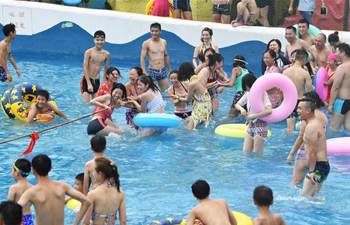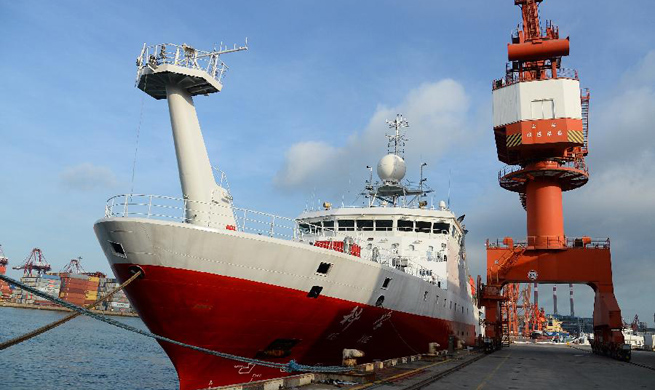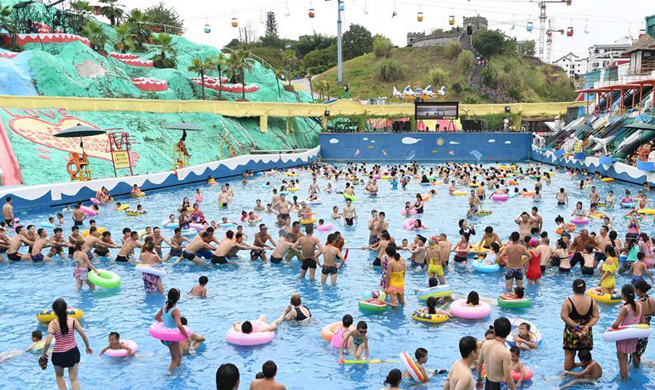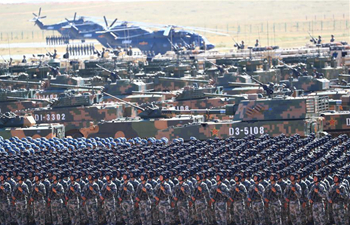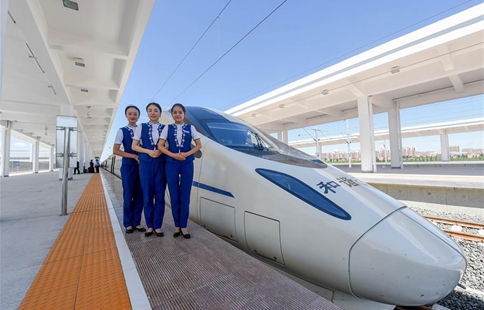by Burak Akinci
ANKARA, Aug. 7 (Xinhua) -- One year after an overnight coup attempt on July 15, 2016, the country's recently reshuffled government has set the economy as their priority task, despite that pro-growth policy is still far from reaching a consensus among all layers of society.
In the cabinet reshuffle made by President Recep Tayyip Erdogan and Prime Minister Binali Yildirim in Mid-July, former Wall Street banker, deputy Prime Minister Mehmet Simsek, who is seen as an anchor of investor confidence, retained his post and will have oversight in the new government.
Simsek, widely respected by investors, said that economy will be the new governments top priority with eyes set on structural reforms.
"Turkey has gone through a dark time. But now the worst is behind us ... The Turkish Economy has proved incredible resilient in recent years, despite political upheaval," said Simsek in remarks to the press.
Experts also stress the need for structural reforms that will lead Turkey to the path of sustainable growth and employment.
"The first and foremost thing necessary to build a sustainable and permanent model of growth is to ensure a climate of confidence. And to that avail you need to launch structural transformations in economy," said Enver Erkan, analyst with Istanbul based KapitalFX company.
And to make sure that growth is equally distributed to all categories of the society, Turkey needs to invest in research and development activities and modern technology, while also make efforts to have a more qualified and educated manpower, Erkan said.
President Erdogan's conservative ruling Justice and Development party (AKP) has been equivalent to the symbol of welfare and prosperity in the public eye since it first came to power in 2002, promising jobs and a better life for millions.
The AKP managed to stay unprecedentedly in power for nearly 15 years in a row, boosting growth to levels beyond expectations, amid giant infrastructure and construction projects in the G20 member country.
Erdogan's victory in successive elections was largely attributed to economic reforms launched after a severe economic crisis, to which Turks confronted at the turn of the century.
Since 2003, Turkey has grown at an impressive 5.6 percent of average GDP growth over 14 years, despite the 2008 global financial crisis, the war in Syria, terrorism and the failed coup.
However, cracks were already showing before the coup attempt with a rise of unemployment rate, at 13 percent in January but declining since then, and a stagnated growth.
After the botched coup which Ankara said instigated by rogue soldiers inside the army following instructions from the U.S. based preacher Fethullah Gulen, economic growth, the national currency and the country's credibility took a hit while world top rating agencies advised it was not wise to invest in Turkey.
But growth came back, hitting five percent in the first quarter of 2017, recovering from a 1.8 percent contraction in the third quarter of last year, namely because of government spending that has increased over the past year through an ambitious initiative to subsidize company.
Banks were encouraged to led throttle creation of a credit guarantee scheme, which allowed the government to underwrite nearly 50 billion U.S. dollars in new credit to businesses and executives, while taking on some of the risk of defaults from reluctant banks.
Economy minister Nihat Zeybekci said that Turkey expects a GDP growth above seven percent in the third quarter, a rather ambitious expectation viewed by some experts.
"After the failed coup, Turkey avoided to hit rock bottom because the government has heavily stimulated the economy. The fiscal situation still look solid and capital inflows returned due to favorable external conditions. The main weakness remains as the high external debt," said last week the Dutch bank ABN AMRO in a note to investors.
"We believe that the Turkish government will continue its stimulative policies, at least until the elections in November, as long as fiscal discipline does not come under question," said the bank.
However, it pointed out that Turkey's deteriorating relations with the European Union, where leader are displeased over Erdogan's negative rhetoric against, especially, Germany, Turkey's largest trading partner by far, and a massive crackdown against not only suspected coup plotter but all opposition circles, could harm the medium term prospects of the economy.
Amid a political turmoil and domestic uncertainty, Erdogan won very narrowly in April a critical constitutional referendum that granted him new powers after the 2019 presidential and parliamentary elections.
However, the rejection of some 49 percent of voters on the controversial project suggests that the president's popularity is not as before.
Ankara also had to deal with influence of some 3.5 million Syrian refugees fleeing the war to their neighboring country.
Deadly terrorist attacks in major cities shook further investor confidence.
Foreign tourists, a major income for Turkish economy, are also slowly returning to the sunny beaches.
For now, most of the tourists are from Russia with whom Ankara reconciled after a serious diplomatic crisis caused by the downing of a Russian jet over the Turkish-Syrian border.
Despite improvements and an aggressive government campaign, things seem still not what they used to be. "Yes the Russians are back, and we have also Middle East visitors, but on the way we lost most of the Europeans because of political tensions," said to Xinhua Timir, the manager of a hotel of Antalya, located on the so-called "Turkish Riviera," saying that the number of German visitors is decreasing because of German spats with Turkey.
"It's been a while since we saw a large group of Europeans in our region," he added, reminding that German officials have advised their citizens against traveling or doing business in Turkey amid tensions between the two NATO allies.
Experts warned that diplomatic tension has always a negative effect on the country's economy. "Constant changes in foreign policy could harm economy. Turkey is a country with a current account deficit. Turkey's deficit in 2016 was about 33 billion U.S dollars," said Enver Erkan, underlining the need to stabilize the political situation in Turkey to lure more direct investment.
The tourism sector provides more than one million jobs and is responsible for more than 10 percent of Turkey's GDP, valued at 800 billion dollars.
Experts also underline the negative effects of the brains drain from Turkey, as more educated and business oriented people are leaving the country, subjected to a state of emergency since coup attempt, in which tens of thousands people were arrested or dismissed from public service, leading to seriously political and social divisions.
Turkish official say that the purge is a must to restore stability and order while the opposition accuses Erdogan of leading the country down an increasingly authoritarian path.





